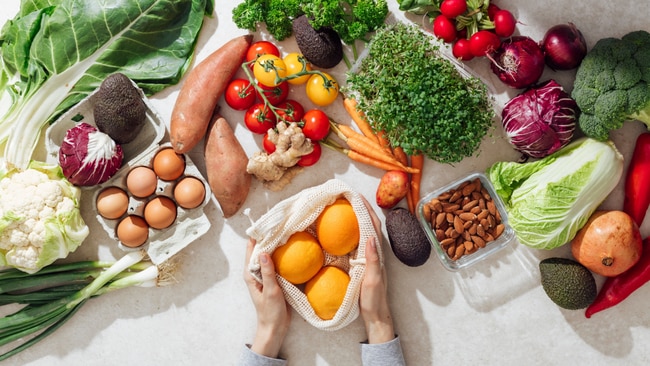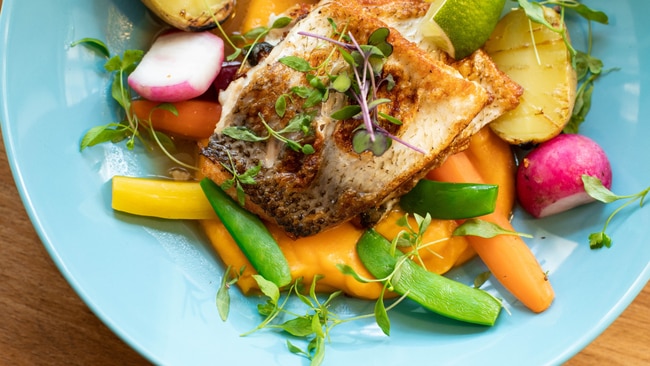This diet could cut your chances of breast cancer in half
Is there anything this diet can’t do?

Lifestyle
Don't miss out on the headlines from Lifestyle. Followed categories will be added to My News.
By adding more fish, vegetables and olive oil to your diet, you could dramatically lower your chances of being diagnosed with breast cancer, a new study has found.
Breast cancer is the most common cancer affecting Australian women, with over 20,000 diagnoses in 2022 alone – that’s about 57 women being told they have cancer every single day. If you had the power to dramatically cut your chances of being diagnosed with breast cancer – just by being intentional about the food you eat, would you do it?
And what if you knew the diet in question could also reduce your chances of heart attack, coronary heart disease, cardiovascular disease, some other cancers, Alzheimer’s disease and dementia, and diabetes – not to mention early indications of it also is associated with maintaining healthy body weight, blood pressure, cholesterol levels, bone health and mental health, including combating depression.
The diet in question is the Mediterranean diet, and you probably already know it’s really having a moment. From the above list, you can see why, but a recent study has also found that women who eat a Mediterranean diet have a 57 per cent lower chance of being diagnosed with breast cancer than those who don’t.
Like what you see? Sign up to our bodyandsoul.com.au newsletter for more stories like this.
Dietitians Australia says the Mediterranean diet can be summed up as:
- Daily consumption of vegetables, fruits, wholegrains and legumes
- Including healthy fats such as extra virgin olive oil and nuts daily
- Fish and seafood eaten at least twice per week
- Moderate amounts of eggs, poultry and dairy products
- Red meat is eaten at most twice per week
What makes the Mediterranean diet so powerful? Naturopath and host of The Shift health podcast Katherine Maslen says there are several factors that work together that mean this diet is a lean, mean disease-prevention machine.
“The most important factor is the wide variety of both nutrients and disease-fighting phytochemicals found in the variety of plants that the Mediterranean diet contains,” she says.
“For example, eggplants contain chlorogenic acid, an anticancer and antioxidant compound. Tomatoes contain lycopene, which prevents heart disease and cancer.
“If you analyse each vegetable commonly consumed in the Mediterranean diet you'll find a wide range of phytochemicals that prevent most chronic diseases. Seasonal fruits also contain a heap of nutrition, and herbs are also used liberally - another great source of phytochemicals.”

Those vegetables and fruits can include olives, artichokes, rocket, eggplant, beetroot, cabbage, carrots, celery and celeriac, cucumbers, fennel, kale, leeks, lemons, lettuce, onions, capsicum, spinach, sweet potatoes, turnips, avocadoes, zucchini, apples, apricots, dates, figs, grapefruit, grapes, oranges, nectarines and peaches, pears, pomegranates, strawberries, tangerines, cherries, melons, and tomatoes.
“Then you have the high fibre intake, which helps to support a healthy microbiome, keep the bowels moving, remove toxins from the body and regulate blood sugar,” says Maslen. “Legumes, a key component of a Mediterranean diet, have both soluble and insoluble fibre that have benefits on the gut level and they also contain phytoestrogens, which have a beneficial impact on oestrogen levels in the body. Grains consumed in a Mediterranean diet are usually whole grain rather than refined, which saves the fibre and nutrient risk outer husk of the grain.
“The last key component is plenty of healthy fats in the way of olive oil, nuts and seeds, eggs and seafood products. Most diets are low in essential fatty acids while in a Mediterranean diet, they are a key component.”
All of those benefits, and a delightful Greek Island feel to our everyday meals: what’s not to love? It’s hard to imagine why every single one of us hasn’t adopted the Mediterranean diet.

Basically, it’s because it requires a bit of thought and planning, explains Maslen.
“In a fast food world where we are time-poor, it can take a little more thought and preparation than our modern diet which is high in packaged foods,” she says. “It can take more time and effort to eat whole foods, and sometimes people get a bit overwhelmed and don't know where to start.”
One way to gently introduce more Mediterranean to our everyday lives is to start with some small changes, suggests Maslen.
“More vegetables with their skins on will help to give you the health benefits,” she says. “Then switch your oil to a good quality cold pressed olive oil. This is very important because cheap commercially produced olive oil can be chemically processed and lose some of its beneficial qualities.”
That means cold-pressed olive oil, which keeps the essential fatty acids in the oil intact.
Maslen says we should also be choosing whole grains over their refined counterparts: think brown rice rather than white rice, and wholegrain flour instead of white flour.
“Maybe also throw in a lentil- or bean-based dish once or twice a week,” suggests Maslen. “Even small tweaks will be helpful and you can build on this over time.”
Of course, your diet is only one factor that counts towards your chances of getting breast cancer. And while there are no guarantees when it comes to disease, there are other lifestyle factors we can be aware of.
“Drinking alcohol significantly increases your risk of breast cancer, so you want to keep it to a minimum,” says Maslen. “We also know that obesity is associated with breast cancer risk so reaching a healthy weight is important.”
More Coverage
Originally published as This diet could cut your chances of breast cancer in half




